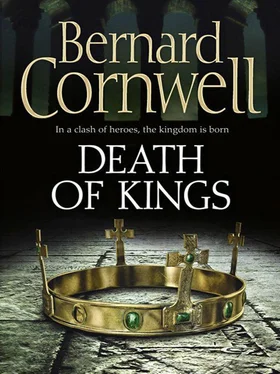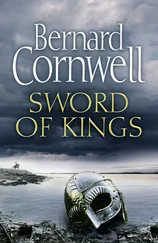‘You too, my dear,’ Æthelwold said to Æthelflaed. He sounded resigned. He beckoned a half-dozen others, his closest companions, who included the abashed Sigebriht, and they all went through the small door at the back of the dais. Æthelflaed looked quizzically at me and I nodded because I had every intention of going to the chapel with her and so she followed Sigebriht, but as soon as we started towards the dais Æthelwold raised a hand. ‘Just Father Coenwulf,’ he said.
‘Where he goes, we go,’ I said.
‘You want to pray?’ Father Coenwulf asked me sarcastically.
‘I want you safe,’ I said, ‘though only your god knows why.’
Coenwulf looked at Æthelwold. ‘I have your word that I am safe in your chapel, lord?’
‘You are my safety, father,’ Æthelwold said with surprising humility, ‘and I want your counsel, I want your prayers, and yes, you have my word that you are safe.’
‘Then wait here,’ Coenwulf snapped at me, ‘both of you.’
‘You trust the bastard?’ I asked, loud enough for Æthelwold to hear.
‘I trust in Almighty God,’ Coenwulf said grandly, and climbed nimbly onto the dais and followed Æthelwold out of the hall.
Steapa put his hand on my arm. ‘Let him go,’ he said, and so he and I waited. Two of the older men came to us and said this had not been their idea and that they had believed Æthelwold when he had assured them that the Witan of Wessex had agreed to his assumption of the throne, and I told them they had nothing to fear so long as they had not raised a weapon against their rightful king. That king, so far as I knew, was still waiting on the old chalk-walled fort to the north of the town, waiting as the long night fell and the stars appeared. And we waited too. ‘How long does a prayer take?’ I asked.
‘I’ve known them to last two hours,’ Steapa said gloomily, ‘and the sermons can take even longer.’
I turned to the steward who had tried to take our swords. ‘Where is the chapel?’ I asked him.
The man looked terrified, then stammered, ‘There is no chapel, lord.’
I swore, hurried to the door at the rear of the hall and pushed it open to see a sleeping chamber. There were fur rugs, woollen blankets, a wooden bucket and a tall unlit candle in a silver holder, beyond which was a second door that led to a smaller courtyard. It was an empty courtyard with an open gate guarded by a lone spearman. ‘Which way did they go?’ I shouted at the guard who answered by pointing west down the street outside.
We ran back to the larger courtyard where our horses were waiting. ‘Go to Edward,’ I suggested to Steapa, ‘tell him the bastard’s running.’
‘And you?’ he asked, hauling himself into the saddle.
‘I’ll go west.’
‘Not on your own,’ he said chidingly.
‘Just go,’ I said.
Steapa was right, of course. There was really little sense in riding alone into the night’s chaos, but I did not want to return to the chalk slopes of Baddan Byrig where, inevitably, the next two hours would be spent discussing what to do. I wondered what had happened to Father Coenwulf, and hoped he was alive, then I was through the gate and scattering the people in the torch-lit street as I spurred the horse down a lane that led eastwards.
Æthelwold had lost his pitiable attempt to be acknowledged King of Wessex, but he had not given up. The folk of his own county had failed to support him, he had only the smallest band of supporters, and so he was fleeing to where he could find swords, shields and spears. He wanted to go north to the Danes, and he had only two choices that I could see. He could ride overland, hoping to circle around the small army that Edward had brought to Wimburnan, or he could go south to where a boat might be waiting for him. I dismissed that last thought. The Danes had not known when Alfred would die, and no Danish boat dared linger in West Saxon waters, which made it more than unlikely that any ship was waiting to rescue Æthelwold. He was on his own for now, and that meant he was trying to ride across country.
And I pursued him, or rather I groped my way into the darkness. There was a moon that night, but the shadows it cast were black on the road and neither I nor the horse could see well and so we went slowly. In places I thought I could detect the fresh hoof-prints, but I could not be sure. The road itself was mud and grass, wide between hedges and tall trees, a drover’s road that followed the river valley as it curved northwards. Sometime in the night I came to a village where light showed in a blacksmith’s hut. A boy was feeding the furnace. That was his job, to keep the fire alight through the darkness, and he cowered when he saw me in my war splendour, my helmet, mail and scabbard lit by the flames that brightened the muddy street.
I stopped the horse and gazed at the boy. ‘When I was your age,’ I spoke from behind my helmet’s cheek-plates, ‘I used to watch a charcoal fire. My job was to stuff the holes with moss and wet earth if any smoke escaped. I watched all night. It can be lonely.’
He nodded, still too terrified to say anything.
‘But I had a girl who used to watch with me,’ I said, remembering Brida in the darkness. ‘You don’t have a girl?’
‘No, lord,’ he said, on his knees now.
‘Girls are the best company on lonely nights,’ I said, ‘even if they do talk too much. Look at me, boy.’ He had lowered his head, perhaps out of awe. ‘Now tell me something,’ I went on, ‘did some men ride through here? They would have had a woman with them.’ The boy said nothing, just stared at me. My horse did not like the heat of the furnace, or perhaps its pungent smell upset him, and so I patted his neck to quieten him. ‘The men told you to keep silent,’ I said to the boy, ‘they said you must keep a secret. Did they threaten you?’
‘He said he was the king, lord,’ the boy almost whispered those words.
‘The real king is close by,’ I said. ‘What’s the name of this place?’
‘Blaneford, lord.’
‘It looks a good place to live. So they rode north?’
‘Yes, lord.’
‘How long ago?’
‘Not long, lord.’
‘And this road goes to Sceaftesburi?’ I asked, trying to remember these heartlands of rich Wessex. ‘Yes, lord.’
‘How many men were there?’ I asked.
‘Dick and mimp, lord,’ he said, and I realised that was his way of counting, different to the ways I was used to, and he was smart enough to realise it too and held up all his fingers once and then just one hand. Fifteen.
‘Was there a priest?’
‘No, lord.’
‘You’re a good lad,’ I said, and he was, because he had possessed the wit to count. I tossed him a scrap of silver. ‘In the morning,’ I said, ‘tell your father that you met Uhtred of Bebbanburg and that you did your duty to your new king.’
He gazed at me with very wide eyes as I turned and rode into the ford where I let the horse drink very little, then spurred uphill.
I remember thinking I could have died that night. Æthelwold had fourteen companions, not counting Æthelflaed, and he must have known he would be pursued. I assume he thought all of Edward’s army would blunder through the night, but if he had known it was a single horseman he would surely have set an ambush and I would have been beaten down by the blades and so hacked to death in the moonlight. A better death, I thought, than Alfred’s. Better than lying in a stinking room with the pain conquering the body, with a lump in the belly like a stone, with dribble and tears and shit and stench. But then comes the relief of the afterlife, the rebirth into joy. The Christians call it heaven and try to scare us into its marble halls with tales of a hell hotter than the blacksmith’s furnace in Blaneford, but I will go with a burst of light in the arms of a Valkyrie to the great hall of Valhalla, where my friends will wait for me, and not only my friends but my enemies too, the men I have killed in battle, and there will be feasting and drinking and fighting and women. That is our fate, unless we die badly, when we live for ever in the frigid halls of the goddess Hel.
Читать дальше
Конец ознакомительного отрывка
Купить книгу












